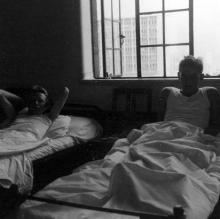Charles Basil MURPHY [1912-1993]
Primary tabs
Barbara Anslow:
Father Murphy was a Canadian RC priest.
Brian Edgar:
I've just found an excellent source for Father Charles Murphy:
http://capebretonsmagazine.com/modules/publisher/item.php?itemid=4318
It's a really long 1993 interview that covers his whole life - although the emphasis in the war years is on his role getting food for Chinese refugees during the fighting rather than his time in camp. There's some archival material including a wartime comic book account of his exploits!
One thing that really comes across is how difficult he found it to talk about the war even 50 years later.
A brief summary of his life is given at http://www.scarboromissions.ca/Learn_about_us/docs/sfm_deceased.pdf :
Rev. Charles Basil Murphy, SFM, Aug 18, 1912—Aug 30, 1993
Born — Glace Bay, Nova Scotia
Ordained—August 9, 1936
Buried—Glace Bay, Nova Scotia
After his ordination, due to the unsettled conditions in China, Fr. Murphy served as a curate at the Immaculate Conception Parish in Sydney Mines for two years. He departed for China in the late fall of 1938 and was stationed at Scarboro’s mission in Lishui.
In December, 1941, he was taken prisoner of war and repatriated from Hong Kong to Goa, India, on a Japanese ship. He returned to China in 1947 and was forced to flee, arriving back in Canada in late 1949.
After his return, a book was published based on his experiences and work during his imprisonment. The book was titled Hong Kong Hero. In 1952 he joined the Canadian Navy as chaplain and served the next 15 years until his retirement in 1967. Since his retirement he resided in Sydney, N.S.


Comments
Father Charles Murphy
The link to Cape Breton's Magazine above is no longer working, but here's an article in the Montreal Gazette that gives a good account of his war work:
https://news.google.com/newspapers?nid=1946&dat=19431202&id=RS8rAAAAIBAJ...
In summary, Father Murphy's work with refugees began on the second day of the hostilities (December 9th) when he and other religious volunteers set up a refugee camp in the grounds of the Maryknoll Mission; 2,000 Chinese people bombed out of urban areas arrived the next day. He made the 11 mile journey into town to get food up to four times a day in an open top car, driving through rifle fire and sometimes bombing raids. This went on until December 23rd when the route into town was too dangerous, and the next day the refugees, knowing what was about to happen, melted away.
New information in the article is that Father Murphy was chair of the Canadian Committee in Stanley and negotiated with the Japanese on an almost daily basis.